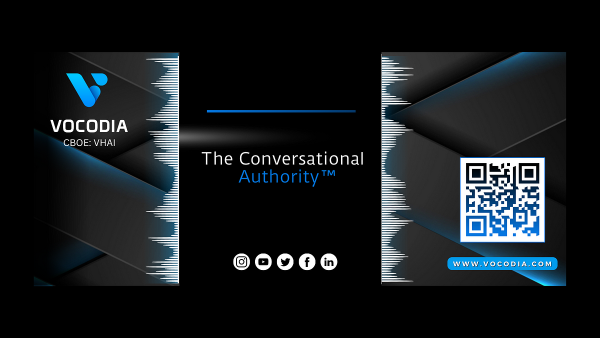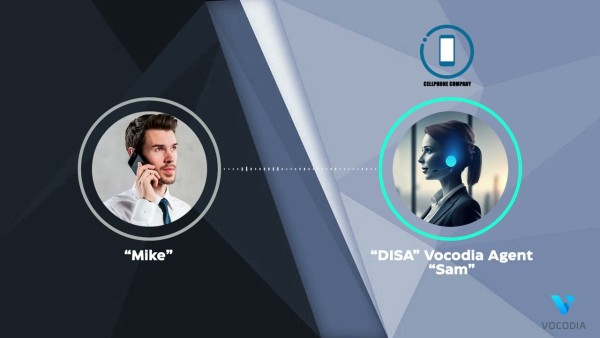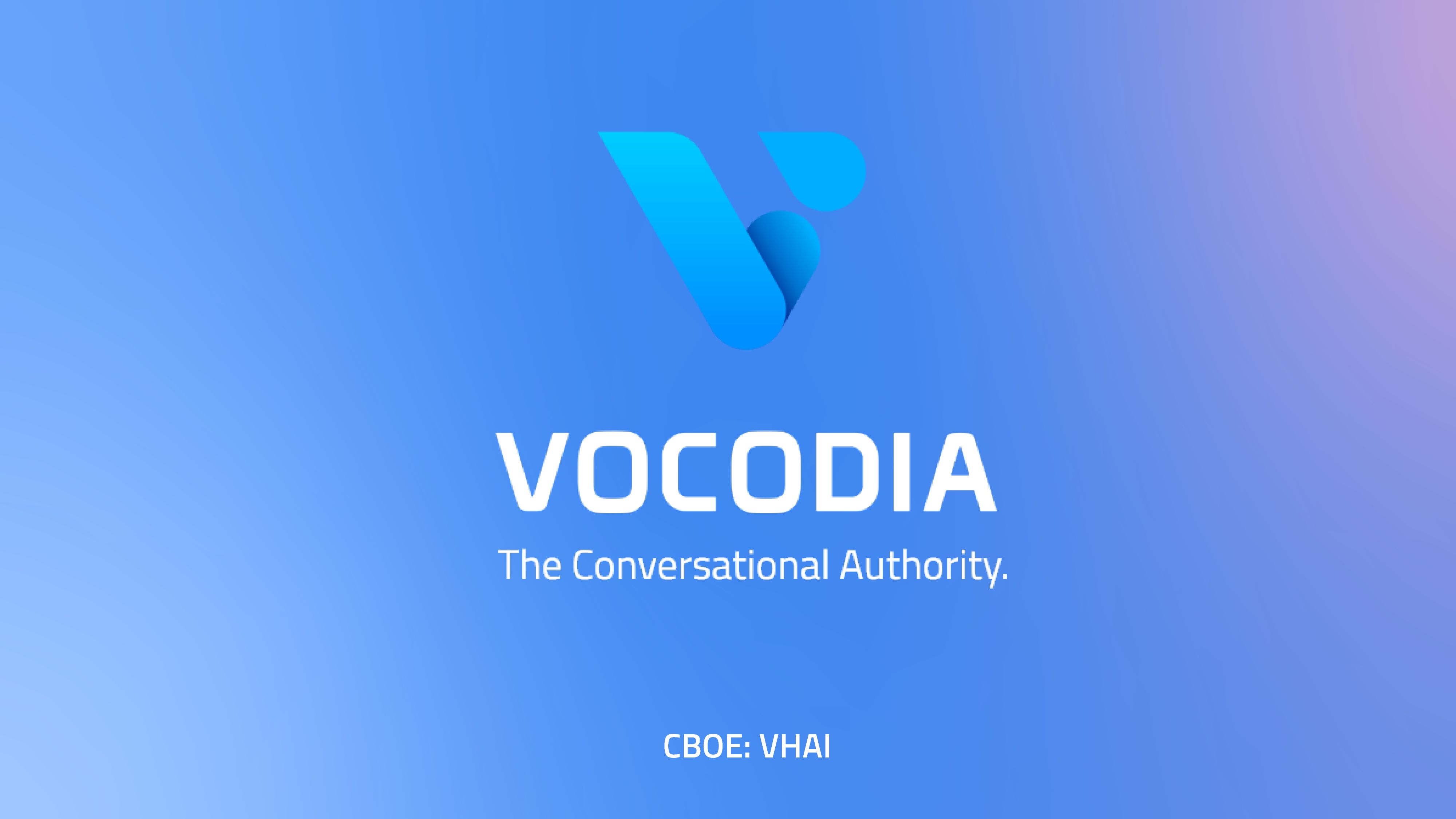Vocodia Holdings (CBOE: VHAI) conversational AI technology is, in many ways, a game-changing product for the service sector. That's more than good news for them; it could also be for investors, with CBOE-listed Vocodia making strides to tap into a global conversational AI market opportunity that Brainy Insights estimated to be worth more than $8.5 billion last year. While enormous today for early market participants like VHAI, the more encouraging opportunities are ahead.
Brainy Insights forecasts that segment growth is expected to appreciate 24% per year into 2033. Extrapolating that, Vocodia could be staring down an over $73 billion market opportunity, with incremental increases along the way providing plenty of near and long-term revenue-generating potential for Vocodia to seize upon. The potentially better news for Vocodia and its investors is that they could get help capitalizing on its being in a sweet spot of opportunity, especially after Nivida revealed its interest in the conversational AI sector by taking a reported $3.7 million stake in sector competitor SoundHound AI (Nasdaq: SOUN) in Q4/2023.
While the technologies of VHAI and SOUN aren't exactly the same, they are definitely in the same "conversational AI" family. That could bode well for Vocodia, considering its technology is more comprehensive than most competing platforms. This could generate substantial interest from companies and clients wanting a one-stop shop that can provide the full range of conversational AI products and services.

Many Conversational-AI Sector Kingmakers
Vocodia offers that kind of product. Thus, while Nvidia played an investment card in SOUN, expect the hand to be continually played out. Remember, Nvidia isn't the only kingmaker in the sector; at least six others in the Magnificent Seven have similar anointing capabilities. And the midcaps can join the game just as quickly, noting valuations in that sphere range between $2 billion and $10 billion. Companies that size may find Vocodia technology quite accretive and an expediter to their missions of growing larger faster.
Vocodia could actually be in the crosshairs of some, noting the importance of staying proactive instead of reactive in an AI sector that is evolving at warp speed. Keep in mind that partnering with a company like Vocodia provides more than technological goods; it allows quick, efficient, and cost-effective system integrations. Similar benefits by competing products, even if not as robust as Vocodia's, attracted investments into other up-and-comers, such as Arm Holdings (Nasdaq: ARM) and Nanox (Nasdaq: NNOX), news that sent shares of those companies soaring. While their prices returned to market earth, the thesis behind their move remains valid- large and small companies need the types of conversational AI products that Vocodia markets.
On the large side, interest in Vocodia technology could come from one or more of the other six Magnificent Seven players, including Amazon (Nasdaq: AMZN), Tesla (Nasdaq: TSLA), Apple (Nasdaq: AAPL), Meta (Nasdaq: META), Microsoft (Nasdaq: MSFT), and Alphabet (Nasdaq: GOOG). Remember, companies this size fight for every tenth of market share, so following Nvidia's lead of acquiring rather than developing would not be a surprise, especially with speed to market often helping secure generative AI-sector leadership positions that can be worth billions today and, according to a report by Bloomberg, worth over $1.3 trillion by 2032.
So, growth through acquisition, a model perfected by the pharmaceutical industry, certainly makes sense. After all, in addition to timeliness to market and inheriting patent use rights, companies can potentially shave tens of millions off of R&D.
What Makes Vocodia Attractive?
Of course, Vocodia must have the assets and fundamentals to attract interest. And they do, which helps expose a compelling value investment proposition. On the capital side, the company has only about 22.7 million shares outstanding, and roughly 11% of those are insider-held. The shares also trade with ample liquidity, indicated by approximately 1.92 million shares exchanging hands daily. That's an attractive setup, but the more important value of measure relates to its intrinsic value and inherent potential to drive company growth and increase shareholder value.
Vocodia CEO Brian Podolak intends to make sure both enjoy an upward trajectory. In an April corporate update, he highlighted the pathway to facilitate making his company bigger. That included detailing key strategic partnerships and intentions for maximizing his company's significant technological breakthroughs. Part of the plan is to leverage the strength inherent within its next-generation conversational AI technology, which is redefining customer interaction standards through efficiency and personalization. Those distinctions and advantages open new doors to revenue opportunities for itself and its clients in major industries worldwide.
Vocodia is already walking through some of them. In February, the company announced initial installations of its AI service platform at a "Top 3" global automobile reseller dealership. According to the update, the program can expedite Vocodia's mission of reaching near-term profitability based on a fixed price per location pricing model. That deal may lead to others, pointing to the company's announced pilot programs with other auto resellers, which could become contributing revenue drivers early this year. But keep in mind that while the company is penetrating the massive auto dealership space at an impressive pace, it's not the only big-ticket market segment opportunity in the company's crosshairs.

Utility Sector Inclusion Can Add Significant Revenue Streams
In March, Vocodia announced launching a pilot program with a major utility provider that wants to use its conversational AI technology to streamline switching energy providers, improve operational efficiency, and reduce its cost per conversion. Considering that the pilot program intends to eventually serve the needs of an energy provider with over 1 million customer connections, validation through implementation could be a transformational period for Vocodia.
The company provides plenty of reasons to support confidence in the project transforming from pilot to full-blown implementation. Foremost is that Vocodia can deliver what many competitors can't, including its always-active proprietary switch upgrades. These upgrades continually increase the speed and reliability of AI-to-customer connections and reduce reliance on external telecom infrastructure. Because that advantage lowers operational risks, the company believes it can be a driving factor in scaling its technology across various industries.
That's happening now. Vocodia noted in a recent presentation that expansion into other sectors is already in its sales pipeline, accelerated by technology that is redefining conversational AI call center service benchmarks. That includes Vocodia's AI platform's current ability to manage 20,000 simultaneous calls using multiple Digital Intelligent Sales Agents (DISAs) to facilitate human-like conversations between machines and humans in over 50 languages. More than excellent in that respect, Vocodia's cloud-based services and technology are scalable and efficient, enabling it to deploy its solutions quickly, seamlessly, and accretive to client operations.
Those are just some of the immediate benefits. More than the conversational clarity provided, Vocodia's conversational AI software technology provides something else critically important to any business- cost and controls. That's earned interest from customer-service-providing clients wanting AI-empowered sales representatives to reduce human labor costs, increase reach, and benefit from purposeful, agenda-driven conversational communications. Vocodia serves that demand through its patent-pending conversational AI software in the form of Digital Intelligent Sales Agents (DISAs), which are built with AI software programmed to sound and feel human and, as importantly, perform business tasks that used to require humans.
Vocodia Organizes A Tireless Sales Force
The Vocodia package's best features are that it provides a sales force that never tires, never falters, and never misses a conversational beat. That trio is more than a facilitator allowing businesses to capitalize on sales opportunities; for many, it can be the means to enhance competitive position and expedite target market penetration and, in some cases, domination. That may sound like embellishment, but it isn't.
DISA is viewed as a game-changer in AI-based communication, an appropriate description considering that DISA works tirelessly 24/7/365 and is designed to maximize every opportunity to drive sales, sign up customers, or promote the client's brand. It also does what many people want to avoid doing: make cold calls. DISA eliminates that dissent by cold-calling prospects, pre-qualifying leads, and even sending out reminders, all with unparalleled efficiency and consistency. Moreover, it never goes off script, ensuring every interaction is on-brand and on-message.
That's not all. Vocodia's solutions aren't just robust; they're also accessible to companies of all sizes and especially valuable as a constantly updated SaaS platform that can eliminate significant back-office expenses. That's a major contributing factor to any company, large or small, wanting to compete more effectively and efficiently in their target markets.
But know that while Vocodia can offer its clients a substantial value-creating platform, they are also in business to make money for itself and increase shareholder value. That intention fits into Vocodia's customer-centric approach, supported by an S-1 filing underscoring its commitment to delivering tangible value to clients and growing shareholder value through potential deals that can generate quick ROI.
A Plan To Grow Larger In 2024
Opportunities, especially mutually beneficial ones that fit within the scope of Vocodia's business, could engage sooner rather than later. Remember, while Vocodia technology is intrinsically valuable to them, it can provide partners, clients, and licensees immediate value from a conversational AI product that can facilitate their fast entry into new markets. Thus, partnering or licensing with Vocodia would make good business sense for many, especially with Vocodia focused on providing services that others either aren't, can't, or that it can do better.
Here's the value kicker of working with Vocodia- companies significantly smaller than their competitors can outperform on a multitude of deliverables if utilizing Vocodia technology to its fullest. It can be as simple as using Vocodia's Digital Intelligence Sales Agent (DISA) to provide that capability by allowing clients to automate and streamline contact center operations. As Vocodia describes it, DISA Master Control is software that sells.
That value proposition improves, especially with DISA speaking with incredibly natural-sounding voices. So well that most people never even suspect they are talking to a machine. It's that good. Even better for those wanting it, Vocodia makes its technology affordable to the business masses with customized plans that get all the perks inherent to continuous SaaS-enabled updates. That's important beyond an operations level; Vocodia's SaaS platform can save money by often eliminating the need for a programmer, perhaps an entire segment of its IT department, to manage the platform. In that respect, the ROI on investing in and implementing Vocodia services can be quick and sustained.
Capitalizing On Valuation Disconnects
Considering the benefits provided, ease of implementation, and being priced for mass adoption, Vocodia stock priced at these levels may be short-lived. Remember, coming onto investor radars post-IPO isn't always a bruise-free journey for young, innovative companies. Indeed, Vocodia has seen its share of bearish days.
However, there reaches a point where fundamentals, a track record of growth, and being in the right sector with the right products at the right time repels bear attacks and helps change trading trajectories. Based on the progress made and that which is expected, that may be the case with Vocodia.
Disclaimers: This presentation has been created by Hawk Point Media Group, Llc. (HPM) and is responsible for the production and distribution of this content. This presentation should be considered and explicitly regarded as sponsored content. Hawk Point Media Group, LLC. has been compensated to create this content as part of a more extensive digital marketing program by an unrelated third party to the company. Accordingly, this content may be used and syndicated beyond the channels used by Hawk Point Media, Llc. This disclaimer and the link to the broader disclosures must be part of all reproductions. Receiving that referenced compensation creates a conflict of interest because the content presented may only provide a favorable viewpoint of the company featured. The contributors do NOT buy and sell securities in the companies featured. HPM holds ZERO shares and has never owned stock in Vocodia Holdings Corp. The information in this video, article, and related newsletters is not intended to be, nor does it constitute, investment advice or recommendations. Hawk Point Media Group, Llc. strongly urges you to conduct a complete and independent investigation of the respective companies and consider all pertinent risks. Readers are advised to review SEC periodic reports: Forms 10-Q, 10K, Form 8-K, insider reports, Forms 3, 4, 5 Schedule 13D. Never take opinions, articles presented, or content provided as the sole reason to invest in any featured company. Investors must always perform their own due diligence before investing in any publicly traded company and understand the risks involved, including losing their entire investment. For the complete disclosure statement, including compensation received, click HERE.
Media Contact
Company Name: Hawk Point Media
Contact Person: Editorial Dept.
Email: info@hawkpointmedia.com
Country: United States
Website: https://hawkpointmedia.com/






